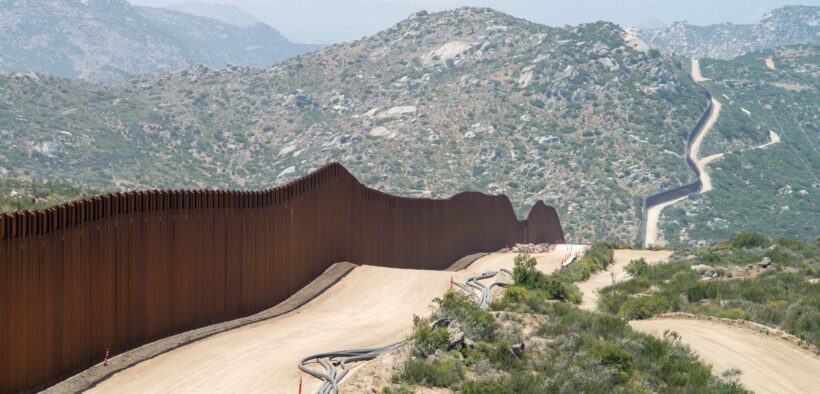Ms. L v. ICE: Balancing Borders Through Ethical Immigration
Share

Image Credits: @gregbulla on Unsplash (Unsplash License)
When former president Donald Trump took office in 2017, one of his primary goals was to secure the United States borders and limit illegal immigration. The Trump administration took severe action to combat the 203% increase in illegal border crossings from March 2017 to March 2018. This featured a piece of legislation known as the “zero tolerance policy,” which forced all undocumented immigrants—including those applying for asylum—who cross the border to be reported to the Department of Justice for possible legal action. Unauthorized asylum seekers were sent to prison, and any accompanying children under the age of eighteen were turned over to the U.S. Department of Health and Human Services (HHS). From there, the unaccompanied children, some of whom were infants and toddlers, were dispersed among 100 Office of Refugee Resettlement (ORR) shelters and other care facilities across the nation, miles away from their parents.
Among these families was “Ms. L,” a refugee fleeing religious persecution in the Democratic Republic of Congo. On November 1, 2017, Ms. L attempted to lawfully seek asylum with her 7-year-old daughter, “S.S.,” through the San Ysidro point of entry in California. Ms. L followed all of the necessary procedures and even passed the official screening that deemed her fear of persecution in her home country to be credible. Soon after, Ms. L and her daughter were forcefully separated. While Ms. L was sent to the Otay Mesa Detention Center near San Diego, S.S. was sent across the country to a facility in Chicago for unaccompanied minors. Ms. L could hear her daughter crying and pleading with officers to let her see her mother. The two were kept on opposite sides of the country for almost four months. During that time, Ms. L refused to eat and could not sleep due to the trauma she faced by having her daughter taken away.
Stories like these were not uncommon; hundreds of families were forcefully separated at the border under the “zero tolerance policy.”
On February 26, 2018, The American Civil Liberties Union (ACLU) filed a federal lawsuit against several federal agencies, including U.S. Immigration and Customs Enforcement (ICE), the Department of Homeland Security (DHS), and U.S. Customs and Border Protection (CPB) in order to reunite Ms. L and her daughter. The lawsuit challenged the constitutionality of the separation, citing due process, federal asylum seeker protection laws and federal directive to release asylum seekers. Shortly after the lawsuit filing, Ms. L was released from the detention center she was being held in. However, she had still not been reunited with her daughter.
On March 9, 2018, the ACLU filed a national class action lawsuit “challenging the Trump administration’s practice of forcibly separating asylum-seeking parents and young children.” The lawsuit seeks claims of relief for adult parents nationwide who (1) are or will be detained in immigration custody by the Department of Homeland Security, and (2) have a minor child who is or will be separated from them by DHS and detained in ORR custody, absent a demonstration in a hearing that the parent is unfit or presents a danger to the child.
Just days after, the court required Ms. L to complete a DNA sample to confirm that S.S. was in fact her daughter in order to begin the reunification process. Finally, on March 16, 2018, Ms. L was united with her daughter once again after spending more than four months apart. “It has been such a painful time. I am so grateful to be with my daughter again. I want to thank all the people who supported me and my daughter,” Ms. L said.
In the early summer following the initial filing of the lawsuit, a federal judge ruled that the ACLU’s challenge to the Trump administration’s forceful separation of families at the border was allowed to proceed. During these preliminary hearings, the Trump administration took a firm stance on separating families at the border, claiming that they had no constitutional right to stay together. The court wholeheartedly rejected that notion, citing “Such conduct, if true, as it is assumed to be on the present motion, is brutal, offensive, and fails to comport with traditional notions of fair play and decency.” After the ACLU sought the nationwide preliminary injunction to halt the separation of families at the border and reunite those separated, a federal judge ruled that all children must be reunited within 30 days, children under five within 14 days, and all parents must be able to speak with their children within 10 days. These key developments sparked hope for the plaintiffs, and the courts even agreed that the practices they were subjected to were unlawful.
On October 16, 2023, after almost five years of ongoing litigation and fights on behalf of the families traumatized by the “zero tolerance policy,” a settlement was finally reached. In total, approximately 5,000 children and their families will be awarded financial compensation as a result of the settlement. On top of that, the U.S. government is continuing its efforts to reunite families and compensate them accordingly while also providing families with key resources like work authorization, housing and legal assistance, and medical services to help them get back on their feet. Most importantly, the settlement includes that the “zero tolerance policy” cannot be reinstated.
Implications
The settlement in Ms. L v. ICE paves the way for more ethical immigration policy in the future. This case draws attention to the balance between maintaining border security and the human rights of those looking to enter the U.S. Under the Trump administration, the scale tipped in favor of border security, which inhibited families from staying together.
With the elimination of the “zero tolerance policy,” the balance has been restored for now. With the upcoming 2024 presidential election, there is immense pressure on both sides of the aisle to secure our borders and protect families simultaneously. If Trump were to win the presidency, the “zero tolerance policy” may return with a new face. Trump has already promised to orchestrate the “largest deportation operation” in U.S. history, modeled after President Eisenhower’s “Operation Wetback” in 1954, when thousands of Mexican immigrants and American citizens were deported. Cases like Ms. L v. ICE set a new precedent for these future border policies, but only time will tell what the future of immigration will look like in the U.S.


Want to get involved?
Connect with us! Connect with us!